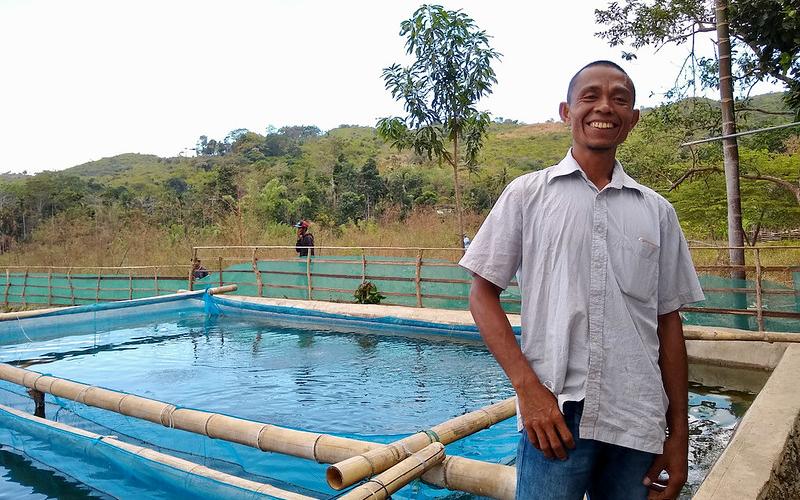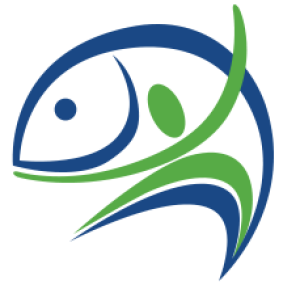
The collaboration with WorldFish, the Timor-Leste government, USAID and New Zealand will help to increase tilapia production and distribution to meet the country’s food security and nutrition needs.
DILI, 23 November 2021—U.S. Agency for International Development (USAID) Mission Director Zema Semunegus and New Zealand Deputy Head of Mission Olivia Philpott today met with fish farmers in Bobonaro municipality and visited the MoreDoc Unipessoal Lda public-private-partnership (PPP) tilapia hatchery in Leohitu to study its success and advance plans to scale aquaculture across Timor-Leste.
The visit was part of joint and ongoing support by USAID and the New Zealand Ministry of Foreign Affairs and Trade (MFAT) to grow the aquaculture sector to fully realize the Timor-Leste National Aquaculture Development Strategy (2012–2030). By 2030, the country aims to increase farmed fish production to 12,000 tons per year and increase fish consumption from 6.1 kg to 15 kg per person each year.
In February 2021, USAID began a $1.2 million partnership with WorldFish to launch the USAID Accelerating Aquaculture Development in Timor-Leste activity (February 2021–August 2022). The activity complements the efforts of the ongoing Partnership for Development in Timor-Leste Phase 2 (PADTL2) project funded by MFAT and implemented by WorldFish a member of CGIAR—the world's largest agricultural research and innovation network— with the Timor-Leste Ministry of Agriculture and Fisheries (MAF).
“Developing aquaculture is a key government priority among others,” said Pedro dos Reis, Timor-Leste’s Minister of Agriculture and Fisheries. “By scaling up fish production, farmers can enhance their livelihoods and earn some extra income, while the sector can help to meet the national need for greater amounts of nutritious fish. Our partnership with MFAT, USAID and WorldFish will greatly help Timor-Leste achieve inclusive and sustainable development in the long term.”
“This collaboration between MFAT, USAID, WorldFish and MAF is key to advance sustainable aquaculture and improved nutrition in Timor-Leste,” said USAID/Timor-Leste Mission Director Zema Semunegus. “We’re excited to be joining hands together to help increase the country’s food security through fish farming to benefit rural families and boost their incomes.”
The PADTL2 project, running from April 2020 until March 2023, works with the government and private sector actors to support the diversification of rural livelihoods through nutrition-sensitive aquaculture. This is by scaling aquaculture to improve the availability, accessibility and consumption of diverse aquatic foods. The goal is to enable greater quantities of safe, affordable and healthy fish, specifically tilapia, to reach the plates of a large number of Timorese households.
“Tilapia is a rich source of micronutrients and essential fatty acids that are needed for good health and development,” said Olivia Philpott, Deputy Head of Mission, New Zealand Embassy Timor-Leste. “Improving supply and encouraging more households to eat farmed tilapia will help to combat malnutrition in Timor-Leste, where one in two children under five years old are stunted. The partnership between MFAT, USAID, WorldFish and MAF to develop aquaculture will be critical to realizing the nutritional benefits of fish.”
A key focus of the PADTL2 project is to establish at least two more hatcheries through the public-private partnership model, whereby construction costs are shared between the owner and the project, to ensure farmer access to high-quality seed of genetically improved farmed tilapia (GIFT). Recently, on October 5, 2021, the project inaugurated the Black Bird PPP GIFT hatchery in Lautem municipality—the first PPP hatchery established in the east of the country.
The project is conducting research to improve GIFT production and productivity by refining sustainable aquaculture technologies. Such technologies will be tested and validated under local conditions, enabling Timorese farmers to complete two production cycles in a year instead of one cycle as is the current practice. In the next 12 months, the project will continue expanding farmer clusters to provide training and support for growing GIFT through sustainable intensification.
The PADTL2 project builds on the successes of the PADTL1 project (2014–2019), supported by MFAT, which helped to lay the foundations for the aquaculture sector’s growth by developing seed, feed and grow-out technologies.
“Currently, local production of farmed tilapia is low and imported farmed fish is much cheaper to buy,” said Dr. Gareth Johnstone, Director General of WorldFish. “We want to turn this situation on its head by ensuring safe, healthy and sustainable farmed fish is produced locally and is available at affordable cost within the reach of rural households. By building on the achievements of phase one of the project, we are confident that our partnership with the Timor-Leste government and private sector actors will support Timor-Leste’s effort to ensure better livelihoods, increased incomes and improved food and nutrition security in the face of climate change.”
###
NOTES TO EDITOR
About Ministry of Agriculture and Fisheries
The Ministry of Agriculture and Fisheries is the government department responsible for the development of the rural sector in Timor-Leste. Approximately 75 percent of the population live in rural areas; the majority of which derive their livelihoods from agriculture. Despite the importance of the sector, and significant investments made by successive governments, the sector’s performance has been mixed and productivity levels remain low. The ministry therefore works to develop a sustainable, competitive and prosperous agricultural sector that can reduce poverty, ensure food and nutrition security, and promote employment and economic growth in the agricultural sector.
About the New Zealand Ministry of Foreign Affairs and Trade
The PADTL2 project is funded by MFAT as part of the New Zealand Aid Program, which seeks to promote prosperity and stability in the Pacific and beyond. The aid program provides financial and technical assistance to reduce poverty and help achieve sustainable development in developing countries. With the aim of creating a more prosperous, secure and equitable world, New Zealand Aid works with a wide range of partners and provides humanitarian assistance to people affected by natural disasters and conflicts.
About USAID
USAID is the world's premier international development agency and a catalytic actor driving development results. USAID works to help lift lives, build communities, and advance democracy.. The United States Government, through USAID, works in partnership with the government of Timor-Leste to support broad-based and effective development. Since 2001, USAID has provided more than $250 million in development assistance to Timor-Leste. USAID supports Timor-Leste in its efforts to build a more prosperous, self-reliant, healthy, and democratic country through programs that foster inclusive and sustainable economic growth, especially in the agriculture and tourism sectors; improve the health of the Timorese people, particularly women and children; and strengthen the foundations of good governance – as highlighted in Timor-Leste’s Strategic Development Plan 2013-2030.
About WorldFish
WorldFish is an international, nonprofit research and innovation institution that creates, advances, and translates aquatic food systems science into scalable solutions. We vision an inclusive world of healthy, well-nourished people and a sustainable blue planet, now and in the future. Our mission is to end hunger and advance progress on the 2030 Sustainable Development Goals through science and innovation to transform food, land, and water systems with aquatic foods for healthier people and the planet. For over 45 years, WorldFish's data, evidence, and insights have shaped practices, policies, and investments to end hunger and advance sustainable development in low- and middle-income countries. We have a global presence across 20 countries in Asia, Africa, and the Pacific, with 460 staff of 30 nationalities deployed where the most significant sustainable development challenges can be addressed through holistic aquatic food systems solutions. Embedded in local, national, and international partnerships, our work sets agendas, builds capacities, and supports decision-making for climate action, food and nutrition security, sustainable fisheries and aquaculture, blue economy, One Health, and AgriTech, integrating gender, youth, and social inclusion.
A core element of the 2030 WorldFish Research and Innovation Strategy: Aquatic Foods for Healthy People and Planet is focused on building the resilience of aquatic food systems to shocks, which is critical to COVID-19 response and recovery.
WorldFish is part of CGIAR, the world's largest agricultural research and innovation network and leads the cross-disciplinary CGIAR Research Program (CRP) on Fish Agri-Food Systems (FISH).
For more information, please visit https://www.worldfishcenter.org.
About FISH
The CGIAR Research Program on Fish Agri-Food Systems (FISH) is a multidisciplinary research program.
Designed in collaboration with research partners, beneficiaries and stakeholders, FISH develops and implements research innovations that optimize the individual and joint contributions of aquaculture and small-scale fisheries to reducing poverty, improving food and nutrition security and sustaining the underlying natural resources and ecosystems services upon which both depend.
The program is led by WorldFish, a member of the CGIAR Consortium. CGIAR is a global research partnership for a food secure future.
For more information, please visit https://fish.cgiar.org.
About CGIAR
CGIAR is the world’s largest global agricultural innovation network. We provide evidence to policy makers, innovation to partners, and new tools to harness the economic, environmental and nutritional power of agriculture.
CGIAR has a wealth of experience and knowledge spanning 50 years that builds on a track-record of innovation and world-class research. Thanks to our funders, CGIAR research has transformed the lives of hundreds of millions of people through tangible research outcomes.
The 15 CGIAR Research Centers are independent, non-profit research organizations, conducting innovative research. Home to more than 8,000 scientists, researchers, technicians, and staff, CGIAR research works to create a better future for the world’s poor. Each Center has its own charter, board of trustees, director general, and staff. CGIAR Research Centers are responsible for hands-on research programs and operations guided by policies and research directions set by the System Management Board.
For more information, please visit https://www.cgiar.org.
RELATED PUBLICATIONS
- Better management practices for genetically improved farmed tilapia (GIFT) in Timor-Leste
- Timor-Leste National Aquaculture Development Strategy (2012–2030)
- Development of sustainable aquaculture in Timor-Leste
RELATED PHOTOS
- Fish farmer: https://flic.kr/p/2gcNUtM
- MFAT, MAF and WorldFish staff at Leohitu launch: https://flic.kr/p/2gcPkqB
- Man and woman eating tilapia: https://flic.kr/p/Gp9D99
- Man with fingerlings: https://flic.kr/p/LjmruY
- Explore more in WorldFish photos: https://www.flickr.com/photos/theworldfishcenter/
CONTACT DETAILS
For more information or to request an interview:
Press contact
Tana Lala-Pritchard
Director of Communications and Marketing
WorldFish
Email: t.lala-pritchard@cgiar.org
Science/project contact
Dr. Jharendu Pant
PADTL 2 Project Leader/Senior Scientist, Sustainable Aquaculture
WorldFish
Email: j.pant@cgiar.org
MFAT
New Zealand Embassy
Email: dil@mfat.govt.nz
USAID
Communications Team
Email: diliusaiddocs@usaid.gov
